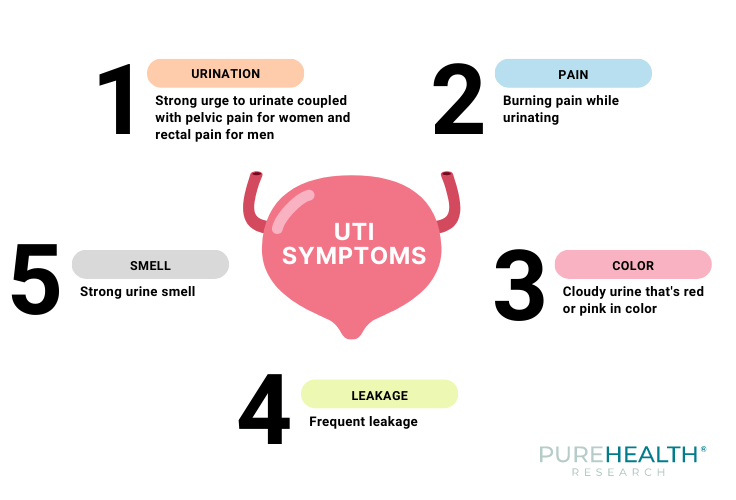How Long Does a UTI Last?
Just how long does a UTI last? This complete guide on UTIs will provide all the information you need. Order your UTIFIX supplement today.


Just how long does a UTI last? You’ve come to the perfect place to find out. Have you noticed blood in your urine of late? Maybe you’ve experienced burning pain when peeing or even passed cloudy or murky urine. If that’s you, then we have your solution. We will go over every important detail about UTIs, as well as their causes and treatments.
Urinary tract infection, or UTI, is a disorder that affects your kidneys, urethra, and bladder. The condition is the result of bacteria, which causes the urinary tract to become infected. Additionally, there are many forms of UTIs depending on where the infection develops in the urinary system. Common urinary tract infections consist of:
- Urethritis: An infection taking place in the urethra, causing a burning feeling each time someone pees.
- Pyelonephritis: Occurs in the kidneys, causing vomiting, fever, pain in the upper back, nausea, and chills.
- Cystitis: Happens in the bladder, making one feel the need to pee frequently, produce bloody or cloudy urine, and experience pain in the lower belly.
The strangest thing about UTIs that still leaves scientists stunned today is that females are more susceptible to them than males. But why are women 30 times more likely to develop the infection, despite both genders having a urinary tract? Well, scientists believe that women are more prone because of their anatomical constitution. Women have a shorter urethra located closer to the rectum than their male counterparts and a more sensitive tissue lining.
UTI Causes and Symptoms
As we mentioned earlier, UTI occurs when bacteria leaks into the urinary tract through the urethra, eventually moving to the bladder or kidneys. Naturally, everyone’s urinary system has the capacity and defenses to fight off bacterial infections. However, persistent forms of bacteria sometimes take hold and develop into full-blown UTIs.
This mostly happens in cases where a person develops the infection but delays or neglects to seek treatment, believing the disease will eventually heal without any medical assistance. Instead, the bacterial strain grows stronger and may require stronger medication. Let’s have a look at how the infection occurs in the bladder and urethra.

UTI in the Bladder
When the infection takes place in the bladder, it’s usually the result of a bacteria known as Escherichia coli (E. coli). In mild cases, this bacteria enters the body through contaminated or unclean food. More so, the bacteria can cause kidney failure in severe circumstances. If you have an infection in the bladder region, you’ll feel a lot of uneasiness in the abdominal area because the lining of the bladder becomes irritated.
If you leave the infection untreated for too long, you risk developing a kidney infection, which can eventually spread to the bloodstream and threaten your life.
UTI in the Urethra
When a UTI occurs in the urethra, it means bacteria in the intestines managed to spread to the urethra from the anus. Alternatively, you can contract a UTI from sexually transmitted infections. STIs like chlamydia, genital herpes, and gonorrhea cause disruptions in the urinary system. Therefore, we recommend also getting tested for STIs, especially if it hurts when urinating.
How Long Does a UTI Last? Signs and Stages

Perhaps you’re experiencing the symptoms listed above and asking yourself, “How long does a UTI last?” If you’re dealing with an uncomplicated UTI, it can go on for two to seven days. Women who don’t take antibiotics or the best supplements for women’s health find that it may take longer for the infection to resolve on its own.
Early Signs of a UTI
During the initial stages of a UTI infection, you may or may not exhibit any symptoms, depending on your body’s reaction to the bacteria. However, as the infection progresses, you’ll start noticing the following warning signs of a UTI:
- Frequent urge to pass urine: You’ll begin to urinate more than usual and realize that you pass very little urine each time.
- Burning pain when urinating: Every time you pass urine, you’ll notice a burning sensation, as though the urine is scathing your urethra as you pee.
- Foul-smelling pee: Another early sign of a UTI pee with an unusual, repelling smell.
- Cloudy or bloody urine: A key indicator that you’re developing a UTI is cloudy, bloody urine.
Different Stages of a UTI
A urinary tract infection develops in various stages within your urinary tract system. The phases of a UTI include:
- Incubation stage: Here’s the period between exposure to the bacteria and showing the early signs. Here, the bacteria replicates itself within your urinary system. It lasts for 2 to 6 days.
- Symptomatic stage: This is when your body starts exhibiting symptoms like pelvic pain, bloody urine, fever, abdominal discomfort, etc. It lasts 3 to 7 days, depending on one’s immune system.
- Decline stage: Here, the symptoms gradually fade away as your immune system goes into defense mode. Taking antibiotics and a supplement can help your body revive faster.
- Convalescence: This is the last stage of a UTI, whereby the symptoms resolve, leaving you with a bacteria-free urinary tract.
Factors Affecting the Duration of a UTI
The big question is, how long does a UTI last? The infection duration is determined by factors that may be beyond your control. This is why we advise seeking medical assistance if you feel as though you have a UTI. Some of the reasons why a urinary tract infection can drag on for weeks include:
- The Infection’s Severity: The duration of illness may differ between people, based on the seriousness of the UTI. If you’re dealing with a complex UTI, its treatment may take more time. Mild urinary tract infections might need a shorter period of recovery.
- The Bacteria’s Sensitivity to Antibiotics: UTIs develop due to different bacterial infections, which may react differently to medication. For instance, a UTI caused by the E. coli bacteria may respond differently to medicine compared to a UTI caused by an STI. This means that your doctor may recommend alternative treatments or longer rounds of antibiotics.
- Patient-Related Factors: How long do UTIs last in different people? Independent factors like an individual’s health, the strength of their immune system, and the presence of other health conditions can affect how long your UTI lasts. If you have a health condition like diabetes, your treatment could take longer to ensure the bacteria is completely wiped out from your system.
- Compliance to Treatment: How long does a UTI last untreated? The correct answer is “longer than it should.” The best way to deal with a stubborn infection is to treat it medically rather than let your body bear the burden of fighting it on its own. However, if you want the medicine to succeed, you need to follow the prescription according to the given instructions.
Can a UTI Go Away on Its Own?

Yes. It is possible for a UTI to clear itself without any drugs. However, we recommend seeking treatment for the UTI if you have other underlying medical conditions. So, how long do UTIs last? If a person has a compromised immune system without knowing it and neglects to seek treatment for a UTI, their body may fail to fight off the infection. This could make the excruciating condition last for weeks or months.
Eventually, this can cause a mild UTI to escalate into a full-blown kidney or bladder infection. Here are some specific complications that can occur from ignoring a UTI.
- Kidney Infection: Infections in the lower urinary tract can easily migrate to the kidneys if one does not seek a treatment and might result in the need of medical care. If this happens, you’ll experience more severe symptoms like high fever, back pain, and probable kidney damage. For such conditions, intravenous antibiotics and staying at the hospital as an inpatient may be necessary for treatment.
- Sepsis: If the infection grows into a more severe form due to a weak immune system, it can lead to deadly sepsis. Sepsis quickly escalates into organ damage, which may cause death without immediate intervention.
- Recurrent Infections: Another complication of failing to treat a UTI on time is persistent, repeat infections that just won’t go away. If the UTI is both chronic and recurrent, it can be troublesome to treat, requiring expensive long-term treatment.
- Complicated UTIs: A complex UTI is one which affects people with underlying medical conditions, pregnant women, and those with malformations in their urinary system. If you don’t treat the infection as soon as it appears, your body could suffer more harm. Imagine a woman ignoring a mild UTI. Even though it can gradually go away, it could leave bacteria residues in her body. If she gets pregnant, her immune system will be under additional stress, increasing the chance of the UTI returning.
- Resistance to Antibiotics: As we mentioned earlier, delaying the treatment of a UTI can make your body immune to medication. This condition will make future infections harder to treat because the bacteria that caused the initial infection will likely develop resistance.
How to Improve UTI Using Home Remedies?
You should ask your doctor, “How long does it take for a UTI to go away?” The response will enable you to know when to expect improvement. In addition to treatment, you can also try some home remedies to help minimize the symptoms and prevent future infections. They include:
Drinking Water
A simple and affordable remedy that you can use to relieve your symptoms is drinking water. This method of self-care is excellent because the water dilutes your urine and flushes out the UTI from your tract. Therefore, don’t be shy to use the bathroom more often than usual.
Using Heating Pads
Some of the common UTI symptoms are pressure around your pelvis area as well as pain in your abdomen. Therefore, using a warm heating pad and laying it gently on your belly will help with the discomfort caused by the infection. Ensure that you use a warm heating pad instead of a hot one.
Avoiding Particular Substances
Drinks like caffeine and alcohol and substances like nicotine and spicy food can irritate and inflame your bladder. Therefore, if you ingest these substances, they will cause you to experience discomfort in your bladder and increase your urge to urinate. The more you pee, the more you will feel pain.
Wiping Properly
Women are advised to wipe themselves using a hand technique that moves from the front area of their genitals to the backside to avoid getting UTIs. One of the reasons why the infection is common in females is because their urethra is close to the rectum, making bacteria travel easily to the urinary tract.
Wearing the Right Underwear
Cotton underwear can help alleviate UTI symptoms because they keep the genital area dry. Nylon underwear, on the other hand, can trap moisture, creating an environment that allows urinary tract infection bacteria to thrive. Therefore, if most of your underwear is not cotton-made, consider buying new ones. We also recommend avoiding tight jeans.
Signs Your UTI Is Going Away
After seeking treatment, you may begin to witness some improvement in your condition. Once you notice signs your UTI is going away, female hygiene products like sprays will no longer be necessary to eliminate the foul smell from the urine. Here are signs that suggest the infection is fading:
- Decreased frequent urination
- Reduced discomfort
- Reduced urinary urgency
- Clearer urine
- Lessened lower abdominal or back pain
- Overall reduction of other UTI symptoms
Final Thoughts
Now you know all about UTIs, their treatment, and their causes. How long can a UTI last? A mild UTI infection can last for three to seven days. If you’ve been experiencing symptoms similar to UTI, it’s time to book that appointment with your doctor.
Sign up for our Healthy Living newsletter!
Advertisement. This site offers health, wellness, fitness and nutritional information and is designed for educational purposes only. You should not rely on this information as a substitute for, nor does it replace, professional medical advice, diagnosis, or treatment. If you have any concerns or questions about your health, you should always consult with a physician or other health-care professional. Do not disregard, avoid or delay obtaining medical or health related advice from your health-care professional because of something you may have read on this site. The use of any information provided on this site is solely at your own risk.










